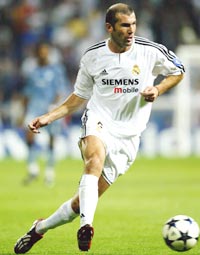Zinedine Zidane's transformation from a poor immigrant kid playing on the gravel pitches of Marseille to the peak of the game was completed on Thursday when he was named the best European footballer of the last 50 years.
 Having inspired France to World Cup and European championship triumphs and spectacularly winning the Champions League for Real Madrid, his place among the greats was assured.
Having inspired France to World Cup and European championship triumphs and spectacularly winning the Champions League for Real Madrid, his place among the greats was assured.
Domestic titles in Italy and Spain as well as three World of Player of the Year awards are further testimony to the modest 31-year-old's status among his peers.
Now, 150,000 fans on a UEFA web site poll have put him above the likes of Franz Beckenbauer and Johan Cruyff as the best European footballer of the past 50 years.
However, just with all the previous honours that have come his way, "Zizou", the softly-spoken son of Algerian parents, remains the most humble of superstars.
| |||||||||||
Zidane has never been one to blow his own trumpet, and with his remarkable talent, he has never needed to.
He can create space from nothing,
Pele of Brazil and Argentina's Maradona stand alongside Zidane as the three leading lights of the world game, each the dominant force of their era.
GRAVEL PITCHES
Like the two South American strikers, Zidane rose from the most modest of backgrounds.
One of his first coaches, Jean Fernandez, claimed his deft ball control developed from playing on the sand and gravel pitches of La Castellane, the poor district of Marseille largely populated by North African immigrants.
It enabled him to learn quickly and his talent was identified early when he became a French under-16 international in a team where he met his best friend, Christophe Dugarry, the man who dubbed him "Zizou".
Zidane trained to become a young professional at Cannes, like Patrick Vieira, before joining Dugarry at Bordeaux.
With another future member of the all-conquering French team of the last decade, Bixente Lizarazu, the three were instrumental in the club's brilliant campaign from the Intertoto to the UEFA Cup final in 1996.
A move to Juventus followed, where he sought to emulate compatriot Michel Platini, building his strength and adding aggression to his game that had been criticised as nonchalant.
After two Serie A titles his influence was undeniable, though he was twice frustrated in the Champions League final.
He duly became the world's most expensive player when he joined Real Madrid in 2001 for $66 million.
The following year he achieved his Champions League dream in the most emphatic style with a wonderfully executed volley to beat Bayer Leverkusen in the final in Glasgow.
But for all his remarkable club achievements, Zizou's real team, the one in which he is the undisputed master and inspiration, remains France's national side.
His debut against the Czech Republic in 1994 was outstanding, coming on as a substitute in the last 18 minutes to score two goals.
By the time France hosted the 1998 World Cup, Zidane was their driving force.
One of his occasional fiery moments could have cost them dear as a red card in the first-round win over Saudi Arabia earned a two-game ban.
But that was all forgotten when, despite a previous record that barely included a significant contribution from his balding scalp, he thundered in two headers to send France on their way to a 3-0 final victory over Brazil at the Stade de France.
Two years later he was named player of the tournament as France added the European championship to their world crown, and Zidane collected his second world player of the year award at the end of 2000.
There is not much left to achieve for Zidane, currently glorying in his third world player of the year award.
But with France's failure in the 2002 World Cup still hurting -- he missed the first two of their three group games through injury -- he has new targets.
A successful defence of the European title in Portugal this year is the first.







 © 2025
© 2025